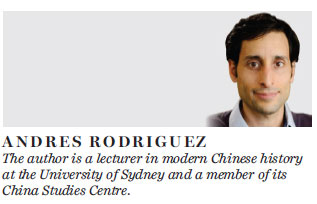SAR cannot forget its refugee past, nor humanitarian spirit
Updated: 2016-04-26 07:13
By Andres Rodriguez(HK Edition)
|
|||||||||
In 1993 I was an international high school student in Hong Kong who once a week volunteered to play with Vietnamese refugee children locked up in the Whitehead Detention Centre. Despite the short distance between my school and the detention center located only a few minutes away from our campus, the contrast between my expansive world and the confined one of the children I visited was a shocking one.
Eleven years later at our high school reunion I was shocked for a different reason; not a single remains of the detention center could be found in what was later to become a base for the People's Liberation Army. As a former Hong Kong resident I can certainly understand the logic behind this in light of the huge demand for land. As a historian, however, I find it disturbing when evidence of our past has simply been brushed away or perhaps in this case dismantled in perpetuity. Whitehead Detention Centre was not a mere accident that got in the way of Hong Kong's development. It was a powerful symbol of Hong Kong's refugee history that many people nowadays seem to conveniently look away from in light of the current humanitarian crisis. Commemorating Whitehead is not the mere whim of a historian. Such sites are important in society as they remind us of who we are and the values we embraced as a community. In their absence, the chances of future generations acknowledging this chapter in Hong Kong's history look slim indeed.

Historically speaking, port cities around the world are by nature receptive to the shockwaves of war, revolution and social disruption. Shanghai for example played an important role in the hosting of Russia's civil war refugees and later on Jews fleeing Nazi Germany. Hong Kong of course is no exception when we look at the number of refugees fleeing into its territory from the days of the Taiping Rebellion to the plight of Vietnamese boat people in the early 1980s. Sheltering people fleeing political persecution also became one of Hong Kong's traits despite the uneasiness this caused at times among its rulers.
Crisis of this nature can bring out the best and worst of humanity. In the early 20th century the concept of a shared humanity - and in the words of historian Keith David Watenpaugh, of "organized compassion" - began to emerge as a response to the tragedies of war and the obligations felt by a concerned international community to address these. This was the birth of modern humanitarianism.
Modern humanitarianism was not alien to the history of Hong Kong. How many of us remember the role played by the director of medical services Selwyn Selwyn-Clarke, who in 1938 prodded the colonial government to assist Chinese mainland refugees fleeing Japan's invasion of the mainland? Selwyn's belief in a shared humanity was crucial to overcome colonial reticence to aid the Chinese during this period. In the early post-war period Hong Kong was pivotal in assisting the international community in the reorganization of war-torn Asia. Overseas Chinese in cooperation with the United Nations operating in Hong Kong generously offered their assistance and ships to resettle displaced Taiwan soldiers of the former Japanese empire. In the late 1970s Hong Kong's government declared itself a first port of asylum for Vietnamese refugees fleeing persecution upon conclusion of the Vietnam War. And while the process to resettle refugees to other states was mired in difficulties, Hong Kong's historical role as a pivotal hub of humanitarianism in Asia was evident once again.
Many a legal argument has been made recently disengaging the SAR from the plights of refugees and asylum seekers. We are constantly reminded that Hong Kong, as opposed to Macao or the Chinese mainland, is not bound by any refugee-related convention. At the same time, legal barriers for refugees (and material ones as well) are now being debated in the US and Europe as I write this piece. Such seems to be the trend that is slowly constraining the humanitarian efforts of organizations and people around the world. Hong Kong may indeed be shielded from a legal perspective for the time being. From a wider perspective, however, it would perhaps be wise to consider the lessons of history surrounding Hong Kong's refugee past. Its port city status and its unique geographical position invariably render Hong Kong to be exposed to the tides of refugee history in Asia. No amount of legal barriers will be able to deny this when the next refugee crisis in Asia takes place. In the meantime, switching off our tablets and mobiles will not switch off the plight of so many seeking relief and rehabilitation around the world.
(HK Edition 04/26/2016 page8)